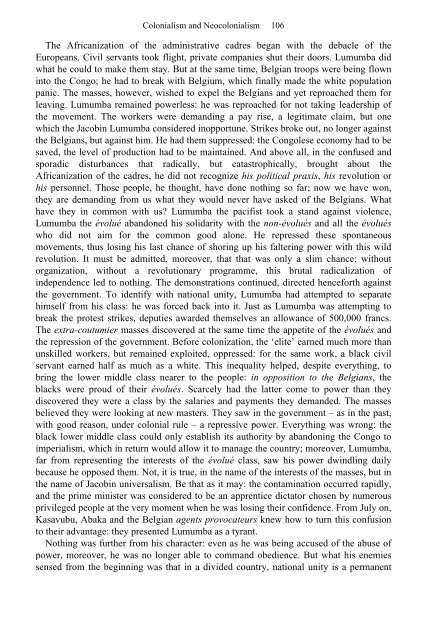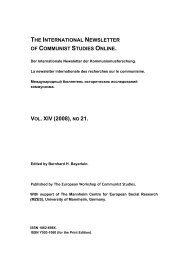11RXNdQ
11RXNdQ
11RXNdQ
Create successful ePaper yourself
Turn your PDF publications into a flip-book with our unique Google optimized e-Paper software.
Colonialism and Neocolonialism 106<br />
The Africanization of the administrative cadres began with the debacle of the<br />
Europeans. Civil servants took flight, private companies shut their doors. Lumumba did<br />
what he could to make them stay. But at the same time, Belgian troops were being flown<br />
into the Congo; he had to break with Belgium, which finally made the white population<br />
panic. The masses, however, wished to expel the Belgians and yet reproached them for<br />
leaving. Lumumba remained powerless: he was reproached for not taking leadership of<br />
the movement. The workers were demanding a pay rise, a legitimate claim, but one<br />
which the Jacobin Lumumba considered inopportune. Strikes broke out, no longer against<br />
the Belgians, but against him. He had them suppressed: the Congolese economy had to be<br />
saved, the level of production had to be maintained. And above all, in the confused and<br />
sporadic disturbances that radically, but catastrophically, brought about the<br />
Africanization of the cadres, he did not recognize his political praxis, his revolution or<br />
his personnel. Those people, he thought, have done nothing so far; now we have won,<br />
they are demanding from us what they would never have asked of the Belgians. What<br />
have they in common with us? Lumumba the pacifist took a stand against violence,<br />
Lumumba the évolué abandoned his solidarity with the non-évolués and all the évolués<br />
who did not aim for the common good alone. He repressed these spontaneous<br />
movements, thus losing his last chance of shoring up his faltering power with this wild<br />
revolution. It must be admitted, moreover, that that was only a slim chance: without<br />
organization, without a revolutionary programme, this brutal radicalization of<br />
independence led to nothing. The demonstrations continued, directed henceforth against<br />
the government. To identify with national unity, Lumumba had attempted to separate<br />
himself from his class: he was forced back into it. Just as Lumumba was attempting to<br />
break the protest strikes, deputies awarded themselves an allowance of 500,000 francs.<br />
The extra-coutumier masses discovered at the same time the appetite of the évolués and<br />
the repression of the government. Before colonization, the ‘elite’ earned much more than<br />
unskilled workers, but remained exploited, oppressed: for the same work, a black civil<br />
servant earned half as much as a white. This inequality helped, despite everything, to<br />
bring the lower middle class nearer to the people: in opposition to the Belgians, the<br />
blacks were proud of their évolués. Scarcely had the latter come to power than they<br />
discovered they were a class by the salaries and payments they demanded. The masses<br />
believed they were looking at new masters. They saw in the government – as in the past,<br />
with good reason, under colonial rule – a repressive power. Everything was wrong: the<br />
black lower middle class could only establish its authority by abandoning the Congo to<br />
imperialism, which in return would allow it to manage the country; moreover, Lumumba,<br />
far from representing the interests of the évolué class, saw his power dwindling daily<br />
because he opposed them. Not, it is true, in the name of the interests of the masses, but in<br />
the name of Jacobin universalism. Be that as it may: the contamination occurred rapidly,<br />
and the prime minister was considered to be an apprentice dictator chosen by numerous<br />
privileged people at the very moment when he was losing their confidence. From July on,<br />
Kasavubu, Abaka and the Belgian agents provocateurs knew how to turn this confusion<br />
to their advantage: they presented Lumumba as a tyrant.<br />
Nothing was further from his character: even as he was being accused of the abuse of<br />
power, moreover, he was no longer able to command obedience. But what his enemies<br />
sensed from the beginning was that in a divided country, national unity is a permanent




